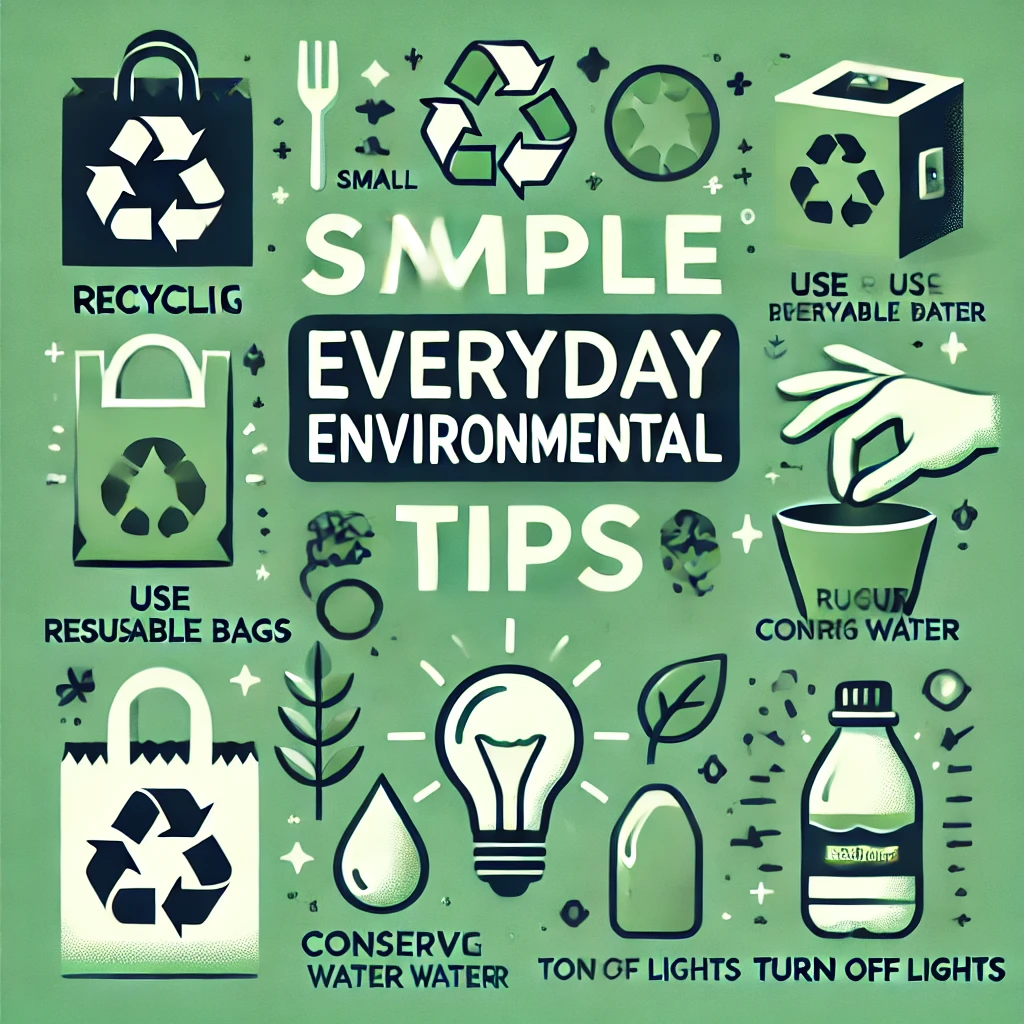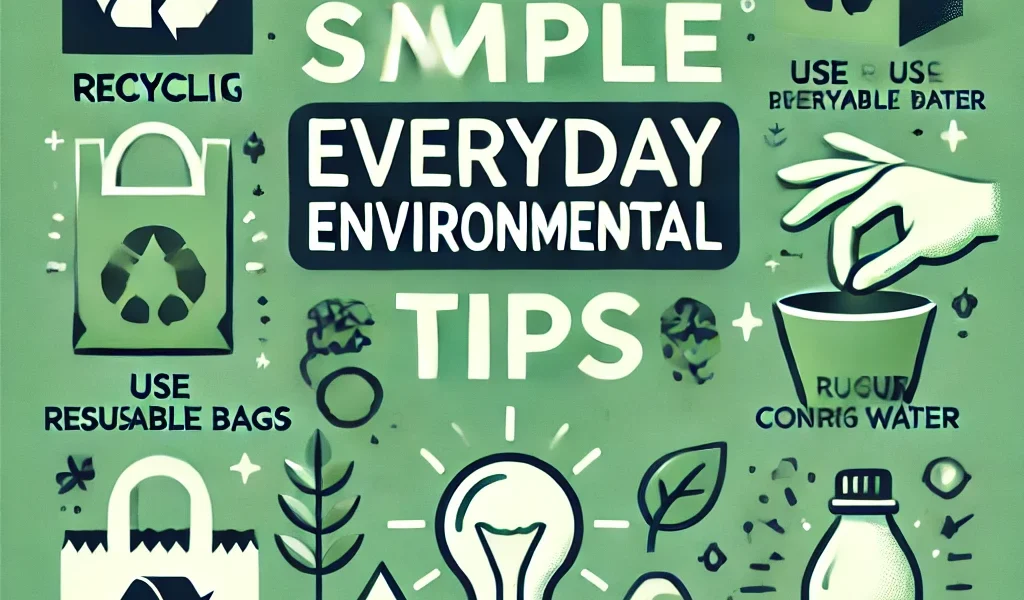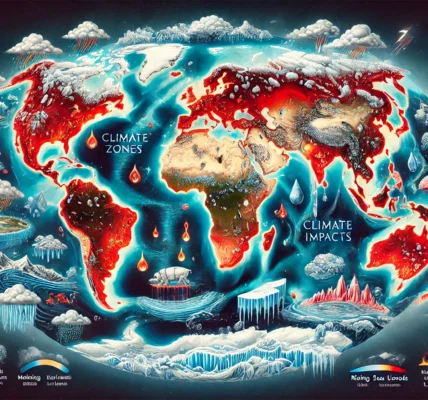Taking care of the environment may seem like a daunting task, but it doesn’t require drastic lifestyle changes to make a positive impact. Small, everyday actions can contribute significantly to environmental sustainability. By adopting practical and eco-friendly habits, you can reduce your carbon footprint, conserve resources, and promote a healthier planet.
In this article, we will explore simple environmental tips that can be easily incorporated into your daily routine. These tips are designed to help you live more sustainably without much effort.

1. Reduce, Reuse, and Recycle
The concept of reduce, reuse, and recycle is a fundamental principle of environmental conservation. It encourages minimizing waste, reusing items, and recycling materials whenever possible.
How to Implement It:
- Reduce: Cut down on single-use items like plastic bags and straws. Opt for products with minimal packaging.
- Reuse: Before throwing something away, think about how it can be repurposed. For example, old containers can be used for storage, and reusable bags can replace plastic ones.
- Recycle: Separate recyclable materials such as paper, plastic, glass, and metal, and dispose of them in designated recycling bins.
Why It Matters:
By reducing waste and recycling materials, you help conserve resources, reduce landfill waste, and lower greenhouse gas emissions.
2. Save Energy at Home
Saving energy not only lowers your utility bills but also helps reduce your carbon footprint. Many energy-saving actions can be easily integrated into daily life.
Simple Ways to Save Energy:
- Switch to LED Bulbs: LED bulbs use far less energy than traditional incandescent bulbs and last longer, making them an eco-friendly choice.
- Unplug Appliances: Electronics and appliances continue to consume energy even when turned off. Unplug devices when not in use to prevent “phantom” energy usage.
- Use Energy-Efficient Appliances: When upgrading household appliances, choose energy-efficient models certified by programs like Energy Star.
Why It Matters:
Energy production, especially from fossil fuels, is a significant source of carbon emissions. By reducing your energy consumption, you help reduce the demand for energy and lower emissions.
3. Conserve Water
Water is one of the most precious natural resources, and conserving it is essential for maintaining environmental balance. Simple water-saving habits can be practiced in everyday life without much effort.
How to Conserve Water:
- Fix Leaks: A leaky faucet can waste gallons of water over time. Fix leaks promptly to avoid unnecessary water loss.
- Take Shorter Showers: Cutting down your shower time by a few minutes can save a significant amount of water each month.
- Turn Off the Tap: Don’t leave the water running while brushing your teeth or washing dishes.
Why It Matters:
Water shortages are becoming more common in many parts of the world due to overuse and climate change. Conserving water helps ensure its availability for future generations.
4. Choose Sustainable Transportation
Transportation is a major contributor to air pollution and carbon emissions. Opting for sustainable modes of transportation can help reduce your environmental impact.
Sustainable Transportation Options:
- Walk or Bike: For short trips, walking or biking is a great way to reduce emissions while also improving your health.
- Use Public Transport: Buses, trains, and subways are more energy-efficient per passenger than cars, making public transportation a greener option.
- Carpool: If you need to drive, consider carpooling with others to reduce the number of vehicles on the road.
Why It Matters:
Reducing the number of cars on the road can lower emissions, reduce traffic congestion, and improve air quality.
5. Support Local and Sustainable Products
Supporting local and sustainably produced goods reduces the environmental impact of long-distance shipping and encourages responsible production practices.
How to Support Sustainable Products:
- Buy Local: Purchase locally produced goods and food whenever possible to support local businesses and reduce the carbon footprint associated with transportation.
- Choose Organic and Fair Trade: Opt for organic and fair trade products that are produced sustainably and ethically.
- Avoid Fast Fashion: Fast fashion has a high environmental cost due to waste and pollution. Choose higher-quality clothing that lasts longer or buy secondhand.
Why It Matters:
Sustainable products are often made with eco-friendly materials and processes. Supporting these products promotes responsible consumerism and reduces environmental harm.
6. Reduce Food Waste
Food waste is a significant environmental issue. In addition to wasting resources like water and energy, food waste contributes to methane emissions when it decomposes in landfills.
Tips to Reduce Food Waste:
- Plan Meals: Before grocery shopping, plan your meals and only buy what you need to avoid overbuying.
- Use Leftovers: Get creative with leftovers instead of throwing them away. Many meals can be repurposed for another day.
- Compost: Composting food scraps reduces waste and creates nutrient-rich soil that can be used for gardening.
Why It Matters:
Reducing food waste helps conserve resources, lower greenhouse gas emissions, and reduce the burden on landfills.
7. Opt for Eco-Friendly Cleaning Products
Many conventional cleaning products contain harmful chemicals that can pollute water and air. Eco-friendly cleaning products are a safer and more sustainable alternative.
How to Choose Eco-Friendly Cleaning Products:
- Look for Natural Ingredients: Choose products made from natural ingredients like vinegar, baking soda, and essential oils, which are safe for the environment.
- Avoid Harsh Chemicals: Stay away from cleaning products that contain harsh chemicals like chlorine and ammonia, which can harm the environment and your health.
- DIY Cleaners: Consider making your own cleaning solutions using simple household ingredients like vinegar and lemon juice.
Why It Matters:
Eco-friendly cleaning products reduce chemical pollution and are often biodegradable, making them a better choice for the environment.
8. Plant Trees or Support Reforestation Projects
Trees play a critical role in absorbing carbon dioxide, improving air quality, and providing habitat for wildlife. Planting trees or supporting reforestation efforts is an excellent way to contribute to environmental preservation.
How to Get Involved:
- Plant Trees: If you have space, plant trees in your yard or community to help absorb carbon dioxide and improve air quality.
- Support Reforestation: Donate to or volunteer with organizations that focus on reforestation and environmental restoration efforts.
Why It Matters:
Trees are essential for a healthy environment. They act as natural air purifiers and play a crucial role in combating climate change.
9. Reduce Paper Usage
In today’s digital age, reducing paper usage is easier than ever. Cutting down on paper consumption can help conserve forests and reduce waste.
Tips to Reduce Paper Usage:
- Go Digital: Opt for digital versions of documents, bills, and newsletters instead of printing them.
- Use Both Sides of Paper: When printing is necessary, use both sides of the paper to reduce waste.
- Recycle Paper: Ensure that all used paper is recycled properly to minimize landfill waste.
Why It Matters:
Reducing paper usage helps conserve trees, reduce waste, and lower the environmental impact of paper production.
Conclusion: Small Changes, Big Impact
Taking care of the environment doesn’t require major lifestyle changes. By incorporating these simple environmental tips into your daily routine, you can make a meaningful difference in protecting the planet. Small actions, such as reducing plastic use, conserving water, and supporting sustainable products, add up over time and contribute to a healthier, more sustainable world.











